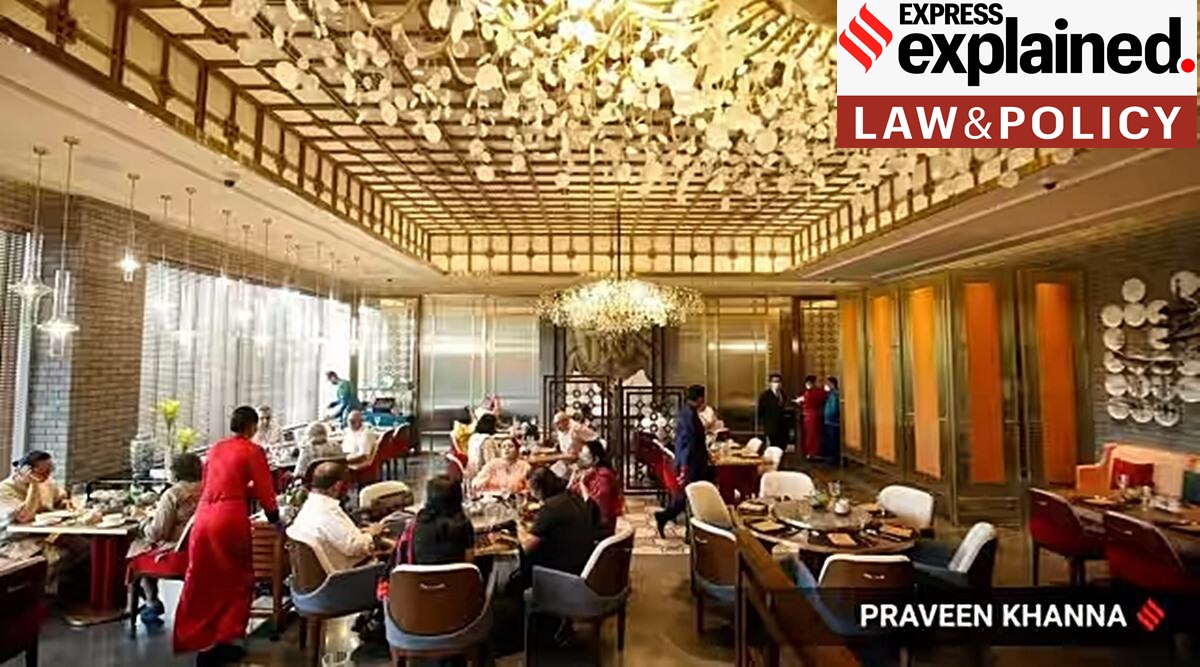The Delhi High Court in an interim order Tuesday directed members of the Federation of Hotel and Restaurant Association of India (FHRAI) to replace the term ‘service charge’ with ‘staff contribution’, while adding that the amount charged should not exceed 10% of the total bill.
In doing so, Justice Pratibha Singh said that around 3,300 FHRAI-associated hotels and restaurants will now specify on their menus in bold that tips need not be given after staff contribution is paid.

“The matter is now required to be heard further. In the meantime, it is directed that the members of FHRAI shall use the terminology ‘staff contribution’ for the amount of service charge that they are currently charging. The same shall not be more than 10% of the total bill amount, excluding GST. The menu card shall specify in bold that after the payment of staff contribution, no further tip is to be paid to the establishment,” the order reads.
What is this case?
The order was passed on pleas filed by the National Restaurant Association of India (NRAI) and the FHRAI, challenging the July 4, 2022, guidelines issued by the Central Consumer Protection Authority (CCPA). The guidelines said that restaurants or hotels should not automatically add service charge to the bill or collect it from consumers under any other name.
On July 20, last year, while hearing this case, Justice Yashwant Varma of the Delhi High Court stayed the CCPA guidelines subject to the association members ensuring that the levying of service charge in addition to the amount and taxes is “duly and prominently displayed on the menu or other places” along with the customer’s obligation to pay the same.
 Also in Explained | What is one-hour trade settlement, which SEBI is planning to launch by March next year
Also in Explained | What is one-hour trade settlement, which SEBI is planning to launch by March next year
Seeking vacation of the court-ordered stay on the 2022 guidelines, the Centre and the CCPA told the Delhi HC in September last year that eateries are still free to decide the food and service prices, adding that the guidelines simply ensure that consumers have the choice to decide whether they should pay the service charge or not.
The Ministry of Consumer Affairs and the CCPA also informed the court that over 1,105 complaints were registered by consumers on the National Consumer Helpline after the guidelines regarding unfair levying of service charges were issued.
After this, the court granted time to the petitioner associations to respond to the government’s stand while extending the interim stay.
Things took a turn this year, however, when Justice Pratibha Singh said on April 12 that this interim order cannot be used to mislead consumers. “It is clarified that the interim order shall not be shown in the display board or menu card in a manner to mislead the consumer,” Live Law reported her as saying. Additionally, the court asked the associations to explore the possibility of using an alternative name for the term “service charge”.
In the April 12 order, the petitioners were asked to file affidavits on what percentage of their members impose the service charge mandatorily in their bills. The court also asked associations to file any objection by members to replacing “service charge” with alternative terminology to prevent confusion in the consumer’s mind that this was a government levy.
On July 24, when neither of the petitioners filed the affidavits, the court imposed a fine of Rs 1 lakh each.
What is the court saying now?
On Tuesday, the FHRAI submitted before the HC that its members were ready to change the terminology from “service charge” to “staff contribution”. However, the NRAI refused, arguing that service charge has been imposed, considered, and upheld in a number of decisions passed in the past and thus required consideration.
During the hearing, the court took note of NRAI’s affidavit stating that 80% of NRAI members impose service charge on its customers as a mandatory condition and that its members did not agree to the changed terminology. “The minutes of the managing committee (of NRAI) on April 18 reveals that terminology can’t be changed and there is also no scope of confusion between service tax and service charge as service tax is no longer being imposed on restaurants,” the court noted.
With respect to the FHRAI’s affidavit, the court noted that there was no uniformity or consistency in their membership, as some members imposed service charge, while others did not.
Consequently, the court directed members of the FHRAI to use the term ‘staff contribution’ in place of ‘service charge’ and to cap it at 10% of the total bill amount. It also dismissed NRAI’s application for waiver of the Rs 1 lakh cost imposed on it for non-compliance with the April 12 order and directed it to deposit the amount within two weeks.
What were the July 4, 2022 guidelines on service charge?
The CCPA stated in the guidelines issued on July 4, 2022, that service charge shall not be collected from consumers by any other name and is optional and voluntary. “Service charge shall not be collected by adding it along with the food bill and levying GST on the total amount,” the guidelines said. Moreover, it cannot be added to the bill automatically, without informing the consumers, it was stated.
The guidelines were issued by the CCPA under Section 18(2)(1) of the Consumer Protection Act, 2019.They were passed after the CCPA noticed the “many grievances registered on the National Consumer Helpline that restaurants and hotels are levying service charge in the bill by default without informing consumers that paying such charge is voluntary and optional”. Further, service charge is levied in addition to the total price of the food items mentioned in the menu and applicable taxes, often in the guise of some other fee or charge, it was noted.
Consumers who found restaurants or hotels violating these guidelines could call the National Consumer Helpline (1915) or file a complaint on the NCH mobile app. Alternatively, they could request that the eatery remove the service charge from the bill.
A complaint against unfair trade practices could also be lodged electronically with the Consumer Commission through the eDaakhil portal for speedy redressal or otherwise. Besides this, complaints could also be submitted to the District Collector of the district concerned for investigation and subsequent proceedings by the CCPA, either through email or in person.
Most Read 1When ex-ISRO chief was told to ‘get lost’ by ISRO satellite centre 2Bigg Boss 17 confirmed list of contestants: Munawar Faruqui, Ankita Lokhande-Vicky Jain, Isha Malviya-Abhishek Kumar in Salman Khan show 3Suhasini Maniratnam says people know Aishwarya Rai only as a ‘beauty’, but she knows her as a ‘real person’: ‘She has got so many qualities…’ 4How Jews first migrated to Palestine, and how Israel was born 5Jakhar says caught off guard: Shot in arm for Congress as several big guns announce ‘ghar wapsi’ from BJP, SAD
The guidelines also clarified that they “shall be in addition to and not in derogation of the guidelines dated 21.04.2017 published by the Department of Consumer Affairs.”
What are the 2017 guidelines?
On April 21, 2017, the Central government issued guidelines prohibiting the levy of service charge on consumers by hotels and restaurants, and terms the charging for anything other than “the prices displayed on the menu card along with the applicable taxes” without “express consent” of the customer as “unfair trade practices”.
Also ReadAge of consent increased from 13 to 16 years in Japan: Here's why302 is not murder, 420 is not cheating: How IPC Section numbers will chan…When can a bill be designated as a ‘money bill’: SC to hear challengeThe ‘new IPC’ removes the punishment for attempting suicide — or does it?…
These guidelines were passed under the Consumer Protection Act, 1986, in light of eateries charging consumers service charges without their consent. It was also noted that many customers have been paying tips to waiters in addition to the service charge, mistakenly assuming that the service charge is part of taxes. Apart from this, there were cases where customers were restrained from entering if they did not agree to pay the service charge.


